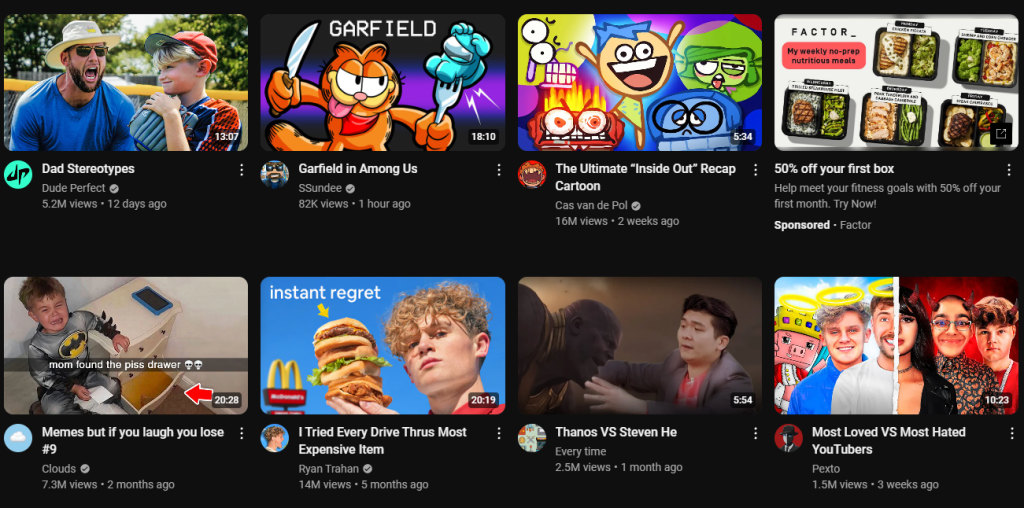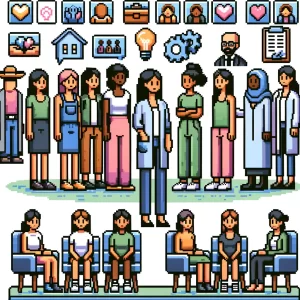
The YouTube Effect on Early Childhood Mental Health
In today’s digital age, YouTube has become a favorite among children for its wide array of videos, which range from educational content to entertainment.
My kids go crazy for stuff like this. I don’t understand it at all.
However, the increasing screen time has sparked concerns among parents, educators, and health professionals. A recent study sheds light on the link between childhood temperament, YouTube usage patterns, and emotional and behavioral problems. This blog delves into the findings, their implications, and why they matter to public health.
The Study at a Glance
Researchers from the Kids Cohort for Understanding Internet Addiction Risk Factors in Early Childhood (K-CURE) in Korea embarked on a journey to understand how early childhood traits influence later YouTube usage and its impact on children’s mental health. The study involved 195 children aged 8-11 and analyzed their YouTube habits and emotional well-being.
Key findings included:
- Early Start with YouTube: A significant 21% of children began using YouTube before age 4, with the average starting age being 8-9 years.
- Frequent Usage: On average, these children used YouTube 4.8 days a week for about 68.5 minutes per day.
- Temperament Matters: Children with high persistence, a trait linked to self-regulation, tended to spend less time on YouTube.
- Emotional Impact: Early and frequent YouTube use was associated with increased emotional and behavioral problems.
Understanding the Impact
Temperament in early childhood is a crucial factor in shaping how children interact with media. Persistence, a trait characterized by the ability to stay focused and not give up easily, was found to play a significant role in YouTube usage. Children with higher persistence scores spent less time on YouTube, suggesting that better self-regulation helps limit screen time.
The study revealed a concerning link between early, frequent YouTube use and heightened emotional and behavioral issues. Children who started using YouTube at a younger age and those who used it more frequently exhibited more problems such as anxiety, depression, and aggression.
Why This Matters for Parents
Understanding these dynamics can help parents manage their children’s screen time more effectively. By recognizing the traits that contribute to excessive usage, parents can implement strategies to foster better self-regulation in their children.
Why this Mattes For Educators
Teachers and educators can use this information to develop curricula and interventions that address digital literacy and responsible media use. Schools can play a vital role in teaching children how to balance screen time with other activities.
Why this Matter For Public Health Practitioners
The findings underscore the need for public health initiatives that promote healthy media habits from an early age. Programs aimed at educating families about the potential risks and benefits of digital media can help mitigate negative outcomes.
The Role of YouTube Algorithms
One of YouTube’s unique aspects is its recommendation algorithm, which suggests videos based on user preferences. This feature can lead to prolonged viewing sessions as children are continually offered content that aligns with their interests. While this might seem harmless, it can contribute to reduced self-control and increased screen time.
What are you thoughts?
- How has YouTube usage affected the behavior and emotional health of children you know? Share specific instances and outcomes.
- What strategies have you found effective in balancing children’s screen time with other activities? Discuss the challenges and successes you’ve encountered.
Conclusion
The relationship between early childhood traits, YouTube usage, and emotional and behavioral health is complex but significant. By understanding these connections, parents, educators, and public health practitioners can take proactive steps to ensure children enjoy the benefits of digital media while minimizing its risks. As we navigate this digital landscape, fostering self-regulation and balanced media habits in children will be crucial for their overall well-being.
Stay Ahead – Get Your Weekly Public Health Update!
Be a health leader! Subscribe for free and share this blog to shape the future of public health.
About the Author
Dr. Jonathan P. Scaccia, PhD, is a clinical-community psychologist with expertise in public health science and practice. He has led evaluation and research initiatives focusing on health equity, vaccine distribution, and organizational readiness. Dr. Scaccia has contributed to federal suicide prevention programs and vaccine equity strategies. He has been recognized for his impactful work and is a leading voice in advancing public health practices.



